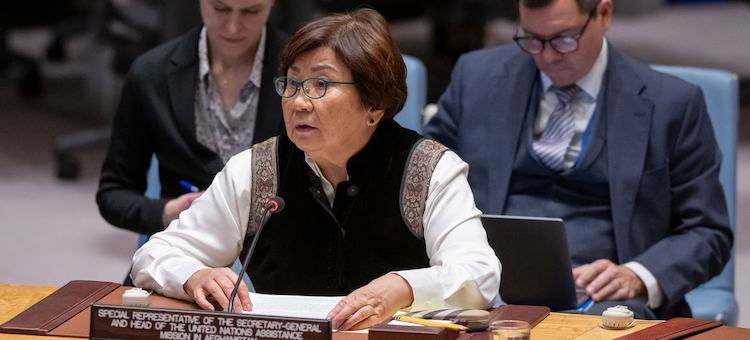By J Nastranis
NEW YORK | 20 December 2023 (IDN) — A lack of progress in resolving human rights issues is a key reason behind the current impasse between Afghanistan and the international community, the UN Special Representative to Afghanistan told the Security Council on 20 December.
Ms. Roza Otunbayeva, who heads the UN Assistance Mission in Afghanistan (UNAMA), also highlighted the need for greater engagement with the de facto Taliban authorities.
She told the Council, Afghans face systemic discrimination against women and girls, repression of political dissent and free speech, a lack of meaningful representation of minorities, and ongoing instances of extrajudicial killings, arbitrary arrests and detentions, torture, and ill treatment.
“Accepting and working to uphold the international norms and standards, as set out in the UN Treaties that Afghanistan has ratified, will continue to be a non-negotiable condition for a seat at the United Nations,” she said.
She welcomed UN-mandated independent assessment of efforts to address the challenges in Afghanistan, in line with a Security Council resolution adopted in March.
The de facto authorities’ response to the report has indicated “a preference for bi-lateral approaches to multilateral ones,” she said, as they continue to maintain that bans on girls’ education and women’s employment are internal matters even though these edicts contravene current treaty obligations.
This will only prolong the impasse that the report intends to resolve.
Otunbayeva said any future approach must be guided by two factors: a durable and more detailed international consensus on Afghanistan. and making far greater use of the de facto authorities’ willingness to engage in dialogue with international actors.
“Dialogue does not legitimize. It can be used to express disapproval while encouraging change,” she said.
Fears about regional security
Updated the Council on developments related to Afghan and regional security, humanitarian affairs, and education, Ms. Otunbayeva said the de facto authorities continue to maintain a generally good level of security in Afghanistan, though unexploded ordnance remains a significant concern, especially for children.
She noted that the Shia community remains at disproportionate risk of harm, with 39 members killed in three attacks in recent months, all which were claimed by the ISIL-KP terrorist group. Nine people were also killed in three further targeted attacks against Shia clerics in Herat.
The regional countries are concerned about additional possible threats emanating from Afghanistan, she said, adding that this is particularly the case for Pakistan, which is convinced that the Afghan de facto authorities have done too little to contain the Tehrik-e Taliban Pakistan, which has claimed major recent terrorist attacks there.
In November, Pakistan also began deporting undocumented Afghans living in the country, nearly half a million of whom have now returned. Ms. Otunbayeva said the situation has led to a deterioration in relations between the two neighbours.
“The returnees are the poorest of the poor. 80,0000 of them have nowhere in Afghanistan to go. The human rights consequences for women and girls forced to return are particularly severe,” she said.
Quality education
She also highlighted how the quality of education in Afghanistan is a growing concern. She said while the international community has rightly focused on the need to reverse the Taliban’s ban on girls’ education, deteriorating standards and access are also affecting boys.
Although UNAMA staff are receiving increasing amounts of anecdotal evidence that girls of all ages can study at madrassas, or Islamic schools, “it is not entirely clear, however, what constitutes a madrassa, if there is a standardized curriculum that allows modern education subjects, and how many girls are able to study in madrassas.”
Ms. Otunbayeva said the de facto Ministry of Education is reportedly undertaking an assessment of these schools along with a review of the public school curriculum. Educational authorities also report that they are working on establishing conditions to allow girls to return to the classroom.
“But time is passing while a generation of girls is falling behind,” she warned. “A failure to provide a sufficiently modern curriculum with equality of access for both girls and boys will make it impossible to implement the de facto authorities’ own agenda of economic self-sufficiency.
Ms. Otunbayeva further pointed to counter-narcotics as another area for further cooperation, noting that the de facto authorities have successfully reduced opium cultivation by 95 per cent, thus addressing a long-standing international concern.
Humanitarian crisis deepening
Meanwhile, Afghanistan remains one of the countries with the highest levels of humanitarian needs and more than 29 million people require assistance this year.
This is one million more than in January and represents a 340 per cent increase in the past five years, said Ramesh Rajasingham, a senior leader in the UN humanitarian affairs office, OCHA.
Thousands of families are now also living in tents and makeshift shelters following three massive earthquakes in Herat province in October, while the sudden arrival of the returnees from Pakistan could have far-reaching consequences.
“The needs of women and girls in Afghanistan have continued to grow at a scale and intensity commensurate with the repressive approach taken by the de facto authorities,” he said.
Although recent months have not seen any additional bans or restrictions imposed on women working for local and international aid organizations, or the UN, Mr. Rajasingham said there have been further attempts to limit their roles, including written requests to remove them from leadership positions.
“Nevertheless, we continue to achieve some degree of practical cooperation with the de facto authorities at the local level, which is enabling Afghan women to be involved in humanitarian action,” he said.
Furthermore, “some humanitarian programmes that were initially suspended due to the bans have now resumed and even expanded operations.” [IDN-InDepthNews]
UN Photo/Manuel Elías |Roza Otunbayeva, Special Representative of the Secretary-General and Head of the UN Assistance Mission in Afghanistan, briefs the Security Council meeting on the situation in the country.
IDN is the flagship agency of the Non-profit International Press Syndicate.


